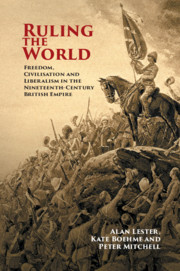Book contents
- Ruling the World
- Ruling the World
- Copyright page
- Dedication
- Contents
- Figures
- Maps
- Acknowledgements
- Introduction
- Part I 1838: The Year of Freedom
- Part II 1857: The Year of Civilisation
- Part III 1879: The Year of Liberalism
- 10 Liberal Fathers and Sons
- 11 Imperialism
- 12 Imperial Wars and Their Aftermaths
- Conclusion to Part III: A Liberal Empire?
- Appendix: Cast of Characters
- Notes
- Index
Conclusion to Part III: A Liberal Empire?
from Part III - 1879: The Year of Liberalism
Published online by Cambridge University Press: 17 December 2020
- Ruling the World
- Ruling the World
- Copyright page
- Dedication
- Contents
- Figures
- Maps
- Acknowledgements
- Introduction
- Part I 1838: The Year of Freedom
- Part II 1857: The Year of Civilisation
- Part III 1879: The Year of Liberalism
- 10 Liberal Fathers and Sons
- 11 Imperialism
- 12 Imperial Wars and Their Aftermaths
- Conclusion to Part III: A Liberal Empire?
- Appendix: Cast of Characters
- Notes
- Index
Summary
It has always been easier to define liberalism by what it is not rather than what it is. Never a coherent programme of governance, it emerged in modern Europe and its offshoots as an expression of the rights of individuals against arbitrary, absolutist governance. Rights of Assembly, representative government, free trade and trial by an independent judiciary had, initially, to be won in Britain through radical agitation. By no coincidence, this occurred at the very time that its governing elites were consolidating a vastly expanded empire in the wake of the Revolutionary and Napoleonic Wars. During our first snapshot of that empire’s governance, in 1838, a liberal order was just emerging in Britain, the new prosperity gained from colonialism being as much a part of that process as the Reform Act of 1832 or the agitation against the Corn Laws. By the mid nineteenth century, British liberals believed in free trade as an economic principle, and as the appropriate response to colonial famines, first in India, then in Ireland and the Cape Colony. The 1867 Reform Act consolidated liberal governance in Britain by extending the franchise again, at the same time that arbitrary rule over black people in Jamaica was condoned. In the mid 1870s, a new feature was added to Britain’s liberal dispensation as Disraeli’s ‘One Nation Tory’ government intervened in housing, working conditions and the education of the workforce.
- Type
- Chapter
- Information
- Ruling the WorldFreedom, Civilisation and Liberalism in the Nineteenth-Century British Empire, pp. 336 - 339Publisher: Cambridge University PressPrint publication year: 2021

